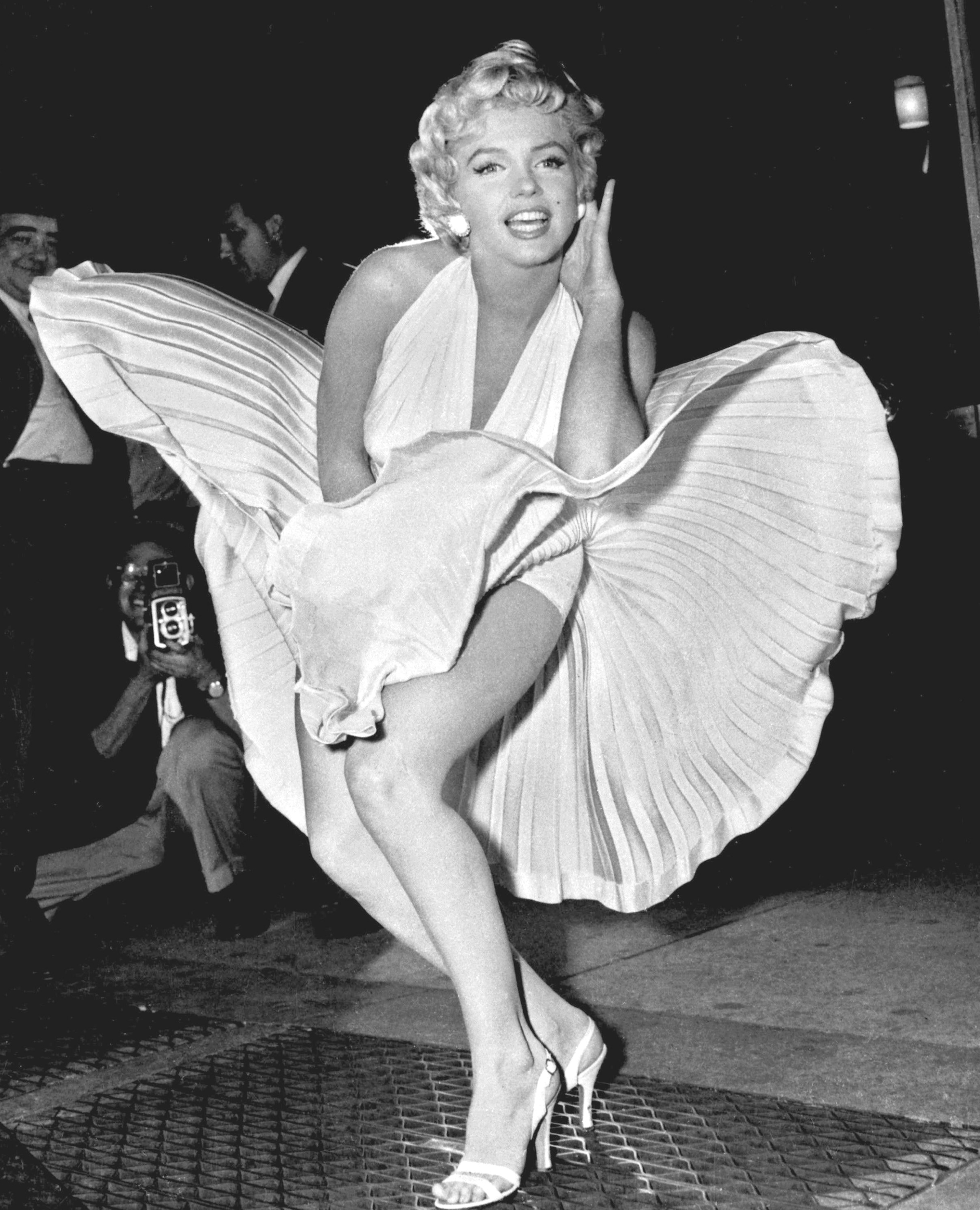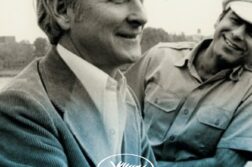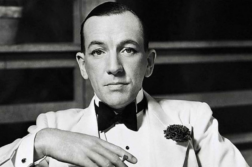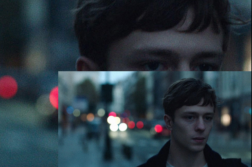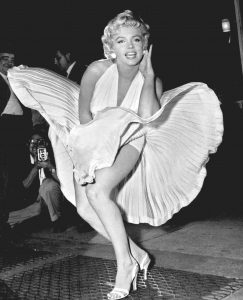 MARILYN MONROE made her movie debut seventy years ago, in the 1947 vehicle Dangerous Years, and her career took off from there—thanks in large part to her five-year relationship with acting coach Natasha Lytess. Monroe would bring Lytess on-set to approve her work—much to the chagrin of her male directors—and Lytess was responsible for Monroe’s over-enunciation of dialog in early films like Gentlemen Prefer Blondes. Lytess was a lesbian, or at least a bisexual, with whom Monroe may or may not have had a dalliance in the early 1950s.
MARILYN MONROE made her movie debut seventy years ago, in the 1947 vehicle Dangerous Years, and her career took off from there—thanks in large part to her five-year relationship with acting coach Natasha Lytess. Monroe would bring Lytess on-set to approve her work—much to the chagrin of her male directors—and Lytess was responsible for Monroe’s over-enunciation of dialog in early films like Gentlemen Prefer Blondes. Lytess was a lesbian, or at least a bisexual, with whom Monroe may or may not have had a dalliance in the early 1950s.
Then there are the stories of Joan Crawford offering the newcomer quality cast-offs if Monroe would only try them on in Joan’s bedroom. And not to be overlooked is the close friendship that developed between veteran actress Barbara Stanwyck and her lovely young costar in Clash by Night (1952). Marilyn herself questioned her sexuality (as I discuss in my new book, Marilyn Forever), but her status as a heterosexual sex symbol made it impossible for her to reveal this side of herself to her public. Still, a number of Hollywood people in the know have left behind tantalizing statements about Monroe’s sexuality. Meanwhile, her panting fans included not just straight men but many lesbians, as other of these quotations reveal.
— Boze Hadleigh
“I discovered Dr. Anna Freud’s findings when she analyzed Marilyn during a week in London in 1956. According to Anna [daughter of Sigmund Freud], Marilyn was bisexual.”—Dr. Lois Banner, Ph.D. and MM researcher and biographer
“Marilyn Monroe gave a quote that was shockingly honest for its time—and ours, or else it would be famous: ‘A man who had kissed me once said it was very possible I was a lesbian because I apparently had no response to males—meaning him. I didn’t contradict him because I didn’t know what I was.’
What a revealing and candid admission. Talk about courageous, even if she guessed her comment would scarcely be reproduced anywhere. Then or now. Check out the quote yourself. That woman is my hero!”—k.d. lang
“Oh, I loved Marilyn! What a delight she was. I realize she was being pitched to the gentlemen, but…ladies of a certain persuasion loved Marilyn—in both senses of the word.”—Nancy Kulp (aka Jane Hathaway on “The Beverly Hillbillies”)
“When you think of Marilyn, or when I do, two words come to mind. Beautiful. Vulnerable.”—Ellen DeGeneres
“Ladies are prettier than menfolk, and I always liked the prettiest. That was Marilyn Monroe. She was the top, like in the Cole Porter song. Marilyn was ‘the impossible dream’ that a lot of us sepia ladies liked to dream about. It didn’t come better than that.”—Nellie Lutcher, singer who at age eleven was playing piano for Ma Rainey, “Mother of the Blues”
“Being a teenage girl with a crush on Marilyn Monroe isn’t a lesbian thing, it’s understandable and sensible. How can anyone possibly criticize that?”—Megan Mulally (“Will and Grace”)
“Some fans get crushes on more threatening figures like Brando or [Brigitte] Bardot or Elvis. Some go for a non-threatening sex symbol…like Marilyn Monroe. I think with her it’s more of a romantic crush.”—Emma Thompson
“The thing with Marilyn is that a woman can find her attractive, even sexually attractive, and still regard her as an icon, a sister, a friend, as somebody they identify with even if their looks and life situation don’t resemble Marilyn’s at all.”—Kathy Najimy (“Sister Act”)
“Marilyn Monroe is a rare example of a star who was ideally beautiful that a woman doesn’t have to feel jealous of. Today’s women can feel for her in a way that women of her own era did not. Women were more programmed to dislike each other. There was minimal solidarity then.”—Elaine Stritch
“Marilyn’s one of the few female stars you can vicariously turn on to without feeling guilty about it. Like, who doesn’t think she’s a turn-on?”—Lili Taylor
“All the girls knew who was for other women in La-La Land and which marriages were phony—matri-phony….The true frisson for a lezzie and for some straight guys was the inside scoop on Marilyn Monroe and that Russian [female]acting coach she lived with and brought onto the soundstages of all her movies.”—Patsy Kelly, openly gay comic actress
“The directors who objected to the presence and the required approval of Natasha Lytess were probably jealous of her. Probably assumed she got to sleep with Marilyn. A man director wants total control of his cast, especially his leading lady. With no competition.”—Arthur Laurents, gay playwright-screenwriter (“Gypsy”)
“One of the bigger Hollywood mysteries was why Marilyn and Natasha split up. Almost inseparable one day, then…phfft! It couldn’t have been Fox [MM’s studio], because they’d already tried breaking them up, and Marilyn had stood firm.”—Charles Nelson Reilly, gay actor and acting coach
“Natasha was with Marilyn almost from her career’s inception. Their relationship ran from 1948 to 1953, the year Marilyn’s superstardom was confirmed at the box office. During those years Natasha helped Marilyn to gain confidence and gave her the tools to act….Obviously when Marilyn broke through big-time in 1953, pressure was applied to drop Natasha for Marilyn’s image and her long-term acceptance by Middle America.”—Dr. Betty Berzon, lesbian psychologist and author
“It may well be that Marilyn Monroe wanted to avoid a Sapphic reputation that would harm her public image and limit her roles. The repertoire afforded her was already pretty limited.”—Jackie Cooper, former child star
“Another of Marilyn Monroe’s tragedies is that if she were bisexually inclined and in love with a woman, she’d have had at all costs to hide it. There was no ‘lesbian chic’ then [during the McCarthy witch-hunt era], just bigotry and reprisal. So instead of possibly being happy with a woman, she had to go through grief with a series of men—husbands and lovers—who done her wrong.”—Amanda Donohoe, bisexual British actress (“L.A. Law”)
“When you’re new or relatively new to the scene, you can get away with a certain amount of nonconformity. But superstardom means mass stardom, and you have to not only appeal to the masses but conform to their standards. So if Marilyn was, so to speak, flaunting her female acting advisor as a new star, once she became a superstar she’d have to dance to the majority tune.”—Ira Levin, playwright-author (“Rosemary’s Baby”)
“Apparently Marilyn had a healthy sexual curiosity. She didn’t see sex or the human body in terms of sin. Yet Hollywood, which exploits sex for profit, is an institution that backs the socioreligious norm.”—Cynthia Nixon
“One can see in her performance and even the way she wore clothes that Marilyn enjoyed her body and enjoyed other people enjoying it. She was truly a sensuous woman.”—bisexual British actress Judy Carne
“I think a big reason Marilyn is such an enduringly appealing, sexy icon is that she’s one of few actresses who looks like she’d actually want and enjoy sex.”—openly bisexual Drew Barrymore
 Boze Hadleigh’s latest book is Marilyn Forever (Taylor Trade Publishing).
Boze Hadleigh’s latest book is Marilyn Forever (Taylor Trade Publishing).


